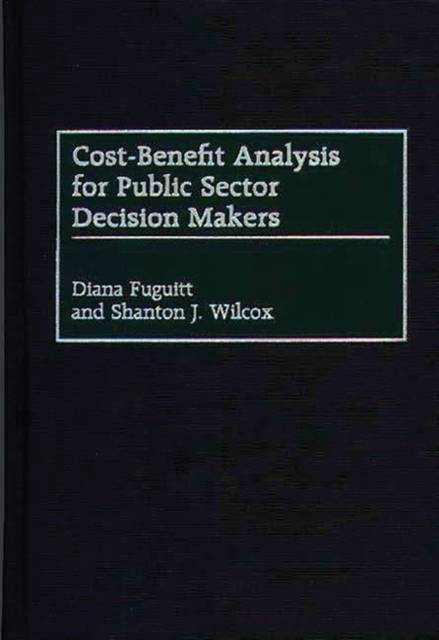
- Retrait gratuit dans votre magasin Club
- 7.000.000 titres dans notre catalogue
- Payer en toute sécurité
- Toujours un magasin près de chez vous
- Retrait gratuit dans votre magasin Club
- 7.000.0000 titres dans notre catalogue
- Payer en toute sécurité
- Toujours un magasin près de chez vous
Cost-Benefit Analysis for Public Sector Decision Makers
Diana Fuguitt, Shanton WilcoxDescription
Fuguitt and Wilcox skillfully guide analysts, public sector managers, and students of decision-making through a full range of the essential steps to perform, interpret, and assess cost-benefit analysis. Their book shows how to grasp the principles of cost-benefit analysis and several related economic valuation methods, how to apply them in undertaking an objective analysis, and how to use the analysis as a decision-making tool across a wide range of fields and applications. An extensive knowledge of economic theory, calculus or advanced graphical analysis is not needed to understand the principles or techniques. Accessible to those who understand basic algebra and have a beginner's hold on statistics, the book also provides a bridge to the more advanced literature in economics and to other analyses used to perform sophisticated valuations. A unique, much-needed presentation of all that is required to gain an immediate, useful understanding of the topic.
The authors explain basic economic concepts and show how they are relevant to understanding an analytical approach. They enumerate principles and detail such technical components as with and without analysis, discounting, decision criteria and uncertainty assessment. The book provides especially extensive coverage of the contingent valuation method along with market valuation, the travel cost and property value methods, human life valuation, and cost-effectiveness analysis. They explain empirical methods used to perform these valuation techniques and cover survey and regression analysis as well. Most importantly, Fuguitt and Wilcox treat the topic within its real-world context--as a decision-making tool to assess a particular policy's efficiency and to provide the decision maker with necessary information. Trade-offs between efficiency and other policy objectives are also addressed, as is the interdisciplinary setting within which cost-benefit analysis is interpreted, enabling readers to understand that policy advocates and adversaries bring their own values and competing interests to bear on any decision-making process.Spécifications
Parties prenantes
- Auteur(s) :
- Editeur:
Contenu
- Nombre de pages :
- 342
- Langue:
- Anglais
Caractéristiques
- EAN:
- 9781567202229
- Date de parution :
- 30-10-99
- Format:
- Livre relié
- Format numérique:
- Genaaid
- Dimensions :
- 159 mm x 236 mm
- Poids :
- 675 g

Les avis
Nous publions uniquement les avis qui respectent les conditions requises. Consultez nos conditions pour les avis.






